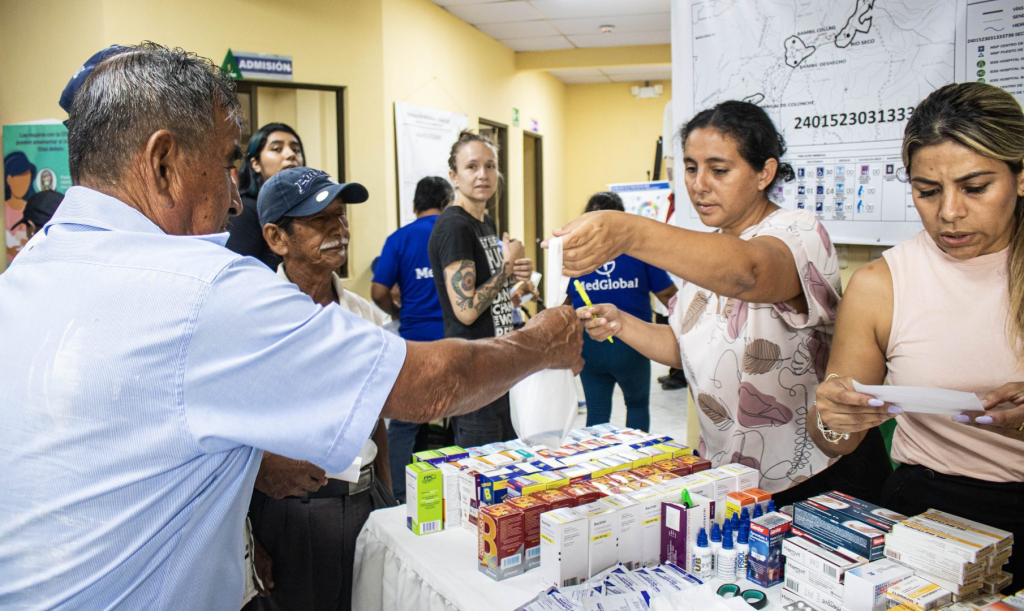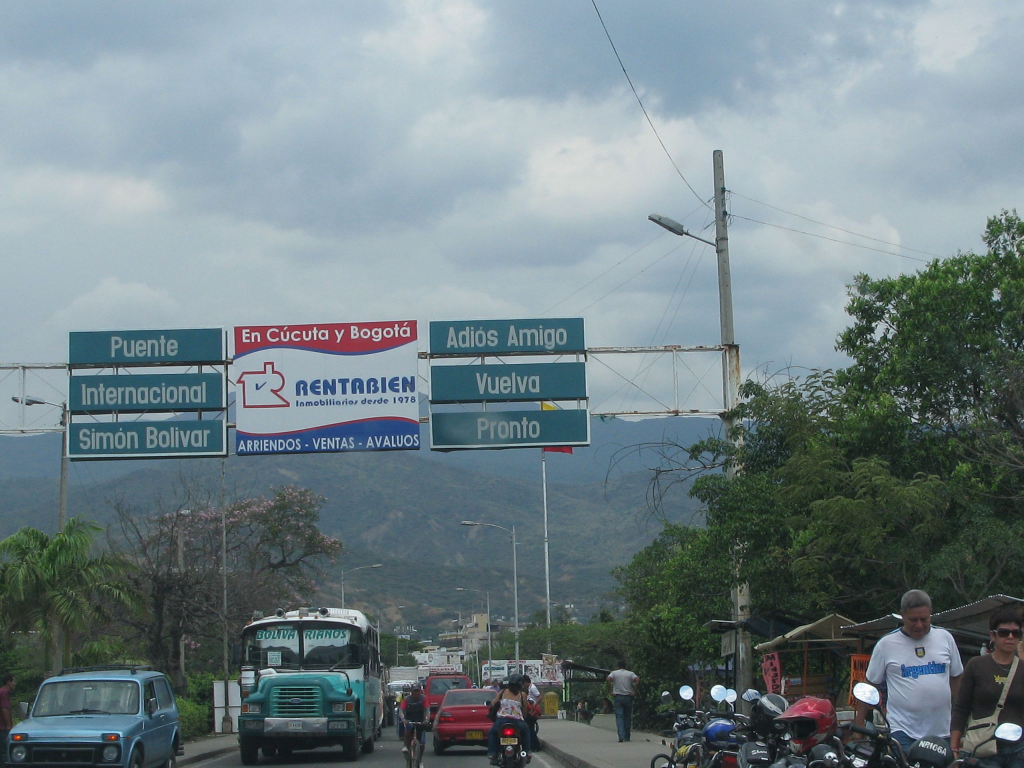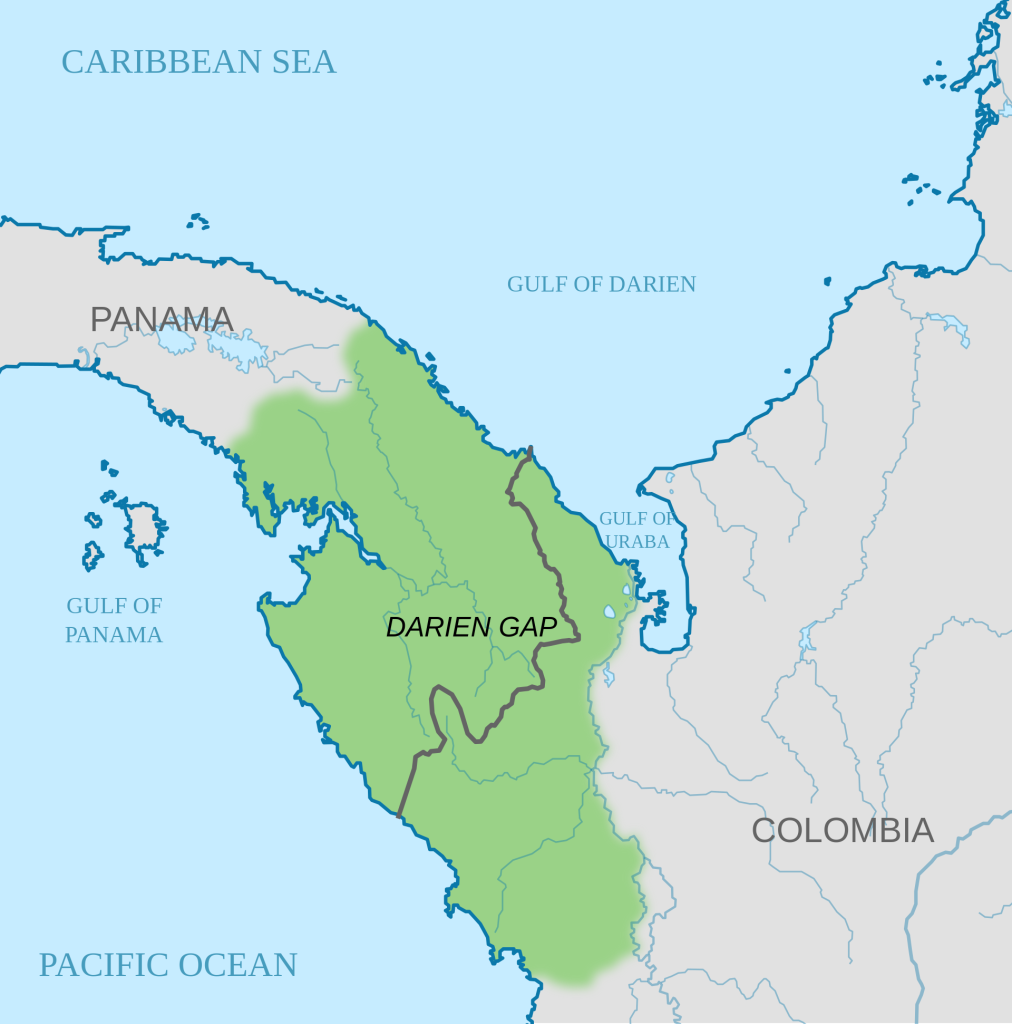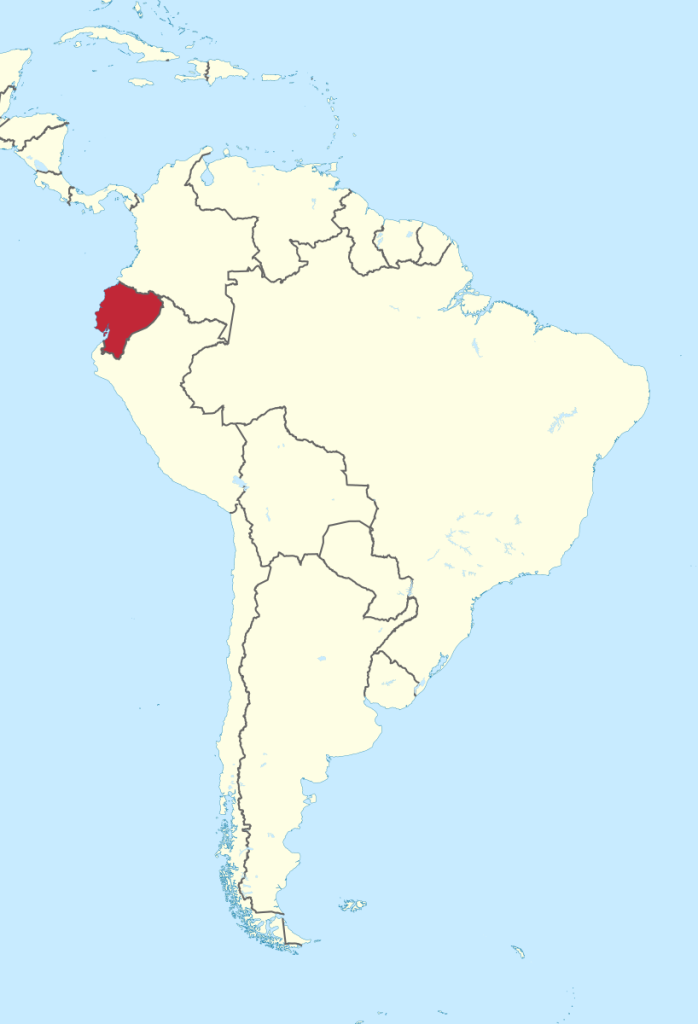First published July 12, 2023 by MedGlobal.

The 2013 collapse of the Venezuelan economy and its political institutions has produced a crisis affecting all of Latin America, growing into the largest migration crisis in the Western Hemisphere. In response to the crisis, MedGlobal has established a number of programs in both Colombia and Ecuador.
Our Colombia office is well established at the nexus of the crisis in Norte de Santander, and we aim to expand to Necoclí, Antioquia Department, to care for the health needs of migrants and refugees along the infamous Darien Gap on their way to Panama and beyond. In 2023, MedGlobal opened a primary care clinic in Guayaquil, Guayas, Ecuador to serve the Venezuelan migrants and host communities. In Mexico, we served migrants both at the Guatemala/Mexico border crossing of Tapachula as well as at the Mexico/Texas border towns of Reynosa and Matamoros, Tamalaupias, Mexico.
Colombia

MedGlobal has been working in the border city of Cúcuta, Colombia since 2019 to improve the healthcare and health of Venezuelan migrants and disadvantaged Colombians. Most of the nearly 8 million Venezuelans who have left their country since 2015 because of the collapse of its health, education, and economic systems passed through Cúcuta. The migration crisis continues and evolves; the same needs, such as prenatal care and specialized care, continue to be a priority yet receive little attention in national and international media.
Most of these migrants have moved to other countries, but almost 2 million remain in Colombia, with more than 100,000 in or near Cúcuta. Many Venezuelans are still leaving their country, while even more cross the now-open border each day to access services that remain unavailable on the Venezuelan side. Venezuelans continue to face food insecurity, limited to non-existent health services, including a lack of vaccines or medications for preventable health problems such as syphilis. Norte de Santander reported an outbreak of gestational syphilis as a public health emergency, with all cases being Venezuelan women.

To address these issues, MedGlobal provides care to both migrating and resident Venezuelans and disadvantaged Colombians in Cúcuta. The MedGlobal primary care clinic is called Casa Venezuela and it is located at the Colombian end of the main bridge from Venezuela (Simon Bolivar International Bridge) in La Parada neighborhood. MedGlobal provides medical care, medications, and basic lab work to Venezuelans who reside in Colombia, those leaving Venezuela, and those who move back and forth to access services. MedGlobal also uses point-of-care ultrasound as a diagnostic tool.
To complement these services, MedGlobal has provided 820 hygiene kits and 820 newborn kits to vulnerable Venezuelan pregnant women who deliver at the main regional hospital, Erasmo Meoz Hospital. The women are in a very dire situation, having little to no prenatal care and without the capacity to buy basic postpartum care supplies. MedGlobal helps these mothers to have a healthier puerperium and provide dignified care to their newborns.
Colombia itself has a very vulnerable population that is internally displaced due to armed conflict. The neighborhood of El Talento comprises displaced Colombians and Venezuelan migrants and refugees. MedGlobal has an arsenal of training programs which are launched through Resiliency Medical Missions, wherein international volunteers work with local health care workers to build capacity or support task-shifting of clinicians through new and innovative programming. MedGlobal has conducted three Resiliency Medical Missions in 2023 in February and April, hosting 10 medical volunteers providing 1468 medical consultations.
Medical consultations, medications and lab-work are provided to the most in need in the area. To continue with case follow-up, health services clinics are conducted twice a month in El Talento. All of these clinical activities continue because of the faithful service of two formally trained community health nurses who live in El Talento, providing patient monitoring and arranging physician care for residents. This is a great example of maintaining health services and building capacity within a low-resource setting. So far, MedGlobal has provided nearly 2,000 medical consultations in Colombia in 2023. Your support is needed to continue to meet the essential health needs of these communities.
Food insecurity continues to be a major issue among this vulnerable group. MedGlobal supports a soup kitchen “comedor” serving food daily to people who do not have enough to eat, focusing on children, pregnant women and elderly. In addition, MedGlobal provides food kits to vulnerable Venezuelans “pendulares” currently living in Venezuela. So far, MedGlobal has provided more than 12,000 meals.
One of our beneficiaries is Mileiny Vivas, a 35 year old woman currently living in Venezuela but travels daily to receive breast cancer oncology treatment in Cúcuta, Colombia. Due to her condition, she does not have a job, and it is challenging for her to find basic food supplies in Venezuela, which is further complicated by price fluctuations.
One of the MedGlobal patients from El Talento is Heidimar Garcia. She is an 11-year-old Venezuelan patient diagnosed with uncontrolled epilepsy with episodes occurring every week posing a huge stress on her life, to the point that she was unable to attend school. The case was initially detected by our local physician, Dr. Daisy Rozo, who scheduled her to continue to be seen by our medical volunteers. During the resiliency medical mission, Ms. Garcia was evaluated by two of our volunteers, Dr. Allison Koening and Dr. Jason Begue, who requested an electroencephalogram and evaluation by an epilepsy specialist. After evaluation, Heidimar was referred to a neurologist-epileptologist who requested lab work to calculate her medication blood level. Medication was provided and she continues to be monitored by Dr. Rozo. The improvement in her lifestyle was evident and she resumed her education at school.
To highlight our work in the region, our Clinic Coordinator and nurse, Ms. Lendy Rojas, participated in the first nursing conference from the Universidad Cooperativa de Colombia “Primer Congreso Binacional de Enfermería: Transformando la acción del cuidado” in Pasto, Colombia. Ms. Rojas provided an overview of MedGlobal activities in Cúcuta and expressed the challenges in the care of the migrant population.
“Nurses provide patient care at all life stages and are the ones who guarantee comprehensive care according to their needs. The migrant population has a wide range of needs that can be addressed from the knowledge and experience of the profession.”
— Lendy Rojas, Nurse, MedGlobal Clinic’s Coordinator
Darien Gap

The refugee crisis at the Darien Gap, a treacherous stretch of dense jungle and rugged terrain between Colombia and Panama, has reached alarming levels. This region has become a perilous route for migrants and refugees fleeing violence, poverty, and political instability in their home countries primarily from Central and South America.
The Darien Gap presents immense challenges, including dangerous wildlife, harsh weather conditions, and lack of infrastructure, making the journey extremely hazardous. Many refugees face the risk of human trafficking, exploitation, and even death as they navigate this unforgiving landscape. The international community must address this humanitarian crisis by providing support, resources, and collaboration to ensure the safety and well-being of those seeking refuge in their search for a better life. In 2022, 250,000 crossed through the Darien gap, the highest ever recorded. Most of the people crossing the Darien Gap in 2023 are Venezuelan nationals (30%) and Haitians (23%). The remaining people mainly come from Ecuador (14%) and China (4%). UNICEF reported 32,500 children crossed the gap with half under 5 years old.
In the fall of 2022, Ms Angela Restrepo, MedGlobal’s country director was requested to participate with PAHO in a needs assessment at Necocli, the staging area in Colombia for refugees and migrants to enter the Darien Gap and Panama. The needs assessment demonstrated the nutritional and human vulnerabilities of all those preparing for that arduous journey. MedGlobal is applying for funding to work alongside PAHO to provide support services, nutrition and hygiene kits to refugees and migrants as they enter the Darien Gap on their way to Mexico and the United States.
Ecuador

Ecuador, a country located in the northwest area of South America, is currently under significant social and political instability. High rates of violence including homicides (its highest rate reached in 2022) have been reported throughout the country. Poor prison conditions, including overcrowding, contributed to a string of gang-related mass killings.
With low economic growth compared to neighboring countries, Ecuador faces a reduction in the funding allocated to social policies, infrastructure, health, and education. In 2023, Ecuador’s economy is slowing and expected to grow by just 2.6 percent. Political and economic crises in the country have led to high rates of informal unemployment which aggravated the social and economic burden during and after the pandemic. Ecuador is also prone to natural disasters such as earthquakes and flooding.
Ecuador has a population of 17.3 million inhabitants with an estimated 40% of its rural population living below the poverty line and 62% of children under a year old suffering from anemia. Ecuador has been reported to have the highest rate of children with chronic malnutrition, just below Guatemala.
The first MedGlobal’s response in Ecuador started in 2020, providing supplies, medications and medical training in response to the COVID-19 pandemic. There are almost 500,000 Venezuelan immigrants and refugees in Ecuador, which has become an important destination and transit country for these individuals.
To address the health needs of Venezuelan migrants and refugees in Ecuador and vulnerable Ecuadorian host communities, MedGlobal established a program in Ecuador. The Centro de Atencion al Migrante (CAM) to provide primary care services including children and adults’ consultations and nutritional services to serve vulnerable Venezuelan migrants and refugees in Guayaquil, Ecuador. So far, MedGlobal has provided 1,793 medical consultations from January to May, 2023. Serving adults, children and elderly, MedGlobal provides primary care services including nutritional services. The CAM is located in a neighborhood known to the Venezuelan community including migrants living as a “refugio” in Guayaquil and has been established as a reference to health services for this community.
“The work I do with MedGlobal is an experience that enriches both physicians and patients in all positive ways.”
— Dr. Gustavo Marcano, physician at CAM
The Santa Elena province is one of the most vulnerable in Ecuador. The area is mostly rural areas with many fishers or farmers. Most of the population collects rural social security and has limited access to health services. To address the needs of vulnerable communities in Santa Elena, MedGlobal conducted a Resiliency Medical Mission to serve the most vulnerable. Together with 6 medical volunteers, MedGlobal served 3 main areas in Santa Elena covering 6 health facilities and serving 1,100 patients.
“Going to Ecuador to volunteer with MedGlobal was an incredible experience. I provided care to children of rural Ecuadorians and Venezuelan refugees, many of whom didn’t have access to a pediatrician in the area. There were many children with genetic disorders as well as common conditions like respiratory illnesses, gastrointestinal complaints, and rashes. During my time there, we utilized point-of-care ultrasound, which allowed us to provide information to parents about their children that they may not have had otherwise.”
— Anik Patel, Pediatrician, MedGlobal Volunteer
El Niño Phenomenon
Ecuador’s geography makes it prone to natural disasters such as earthquakes and flooding. Originally named by fishers along the Peruvian coast, El Niño is a climate phenomenon that prevents cold water rich in nutrients from reaching the surface causing tropical species to go to colder water areas. El Niño is threatening vulnerable coastal communities in the Santa Elena province. Anticipated impacts include severe rainfall from flooding and landslides with critical consequences for local communities. In Ecuador, the coastal areas are at highest risk. The Santa Elena communities mostly rely on fishing and agriculture, two activities which will be affected. El Niño arrived this month (June, 2023) with alerts issued for Guayas and Santa Elena provinces. Vulnerable communities are at high risk due to flooding and associated infectious diseases, crop damage due to heavy rainfall. Fishers will have their fishing activities affected and the effect of rain and flooding can destroy roads leaving entire communities isolated.
In April, 2023, MedGlobal Program Director Mr. David Bock and MedGlobal Medical Director Dr. Nahreen Ahmed visited both Ecuador and Colombia to meet with field teams and local key stakeholders to continue to set priorities and goals for our response in the area.
